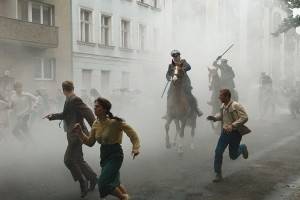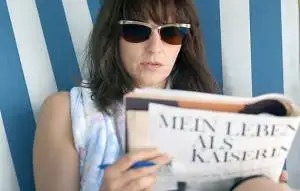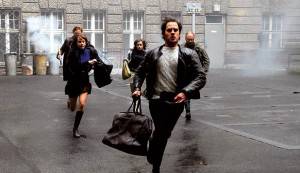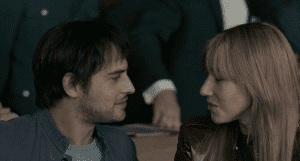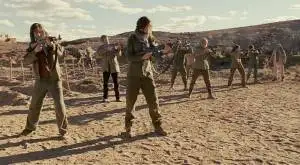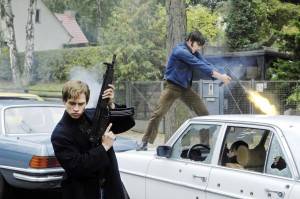The Baader Meinhof Complex
The Baader Meinhof Complex attempts to chronicle in its 150 minute running time the entire decade which saw the rise and fall of the Red Army Faction (RAF), Germany’s most notorious terrorist group. The film was produced and co-written by the late Bernd Eichinger whose Constantin Film company was also responsible for the excellent Downfall the study of Hitler’s final days for which he also furnished the screenplay.
Director Uli Edel shares the writing credit although the film was based on the book of the same name by the former Der Spiegel editor-in-chief Stefan Aust, first published in 1985 and now considered to be the definitive text on the subject. Consequently the movie is somewhat of a hybrid and the two styles often seem at odds with each other, whilst striving for documentary realism it also presents a lot of the film’s violence in the style of a Hollywood action thriller.
The film opens amidst the much publicised visit of the Shah of Iran, his wife and entourage of goons, to the Deutsche Opera in West Berlin, a large group of left-wing students have turned out to protest against the oppressive Iranian regime and the Shah’s henchmen attack the youths with sticks; in the resulting riot one student, Benno Ohnesorg is shot and killed by a German police officer without incitement. This incident became a rallying point for the socialist movement and political journalists like Ulrike Meinhof (Martina Gedeck) were so outraged by the events of 2nd June 1967 that she wrote a condemnatory open letter to the Shah’s wife in left-wing Konkret magazine.
11th April 1968 (less than a year later) the assassination attempt on Rudi Dutschke, the leader of the student union who’s outspoken protest against West Germany’s support of American foreign policy in particular the use of local U.S. Air Force Bases to escalate the carpet bombing of Vietnam, served as a further catalyst for the left-wing youth movement who felt that their parents’ generation passively sat back and let Adolf Hitler seize power; keenly aware that many former Nazis held prominent positions in the current western imperialist government.
Whilst Ulrike Meinhof practices the maxim that the pen is mightier than the sword, Andreas Baader (Moritz Bleibtreu) and his girlfriend Gudrun Ensslin (Johanna Wokalek) believe in direct action and retaliate to the Ohnesorg murder by fire-bombing a department store in Frankfurt for which they are prosecuted. Meinhof, who is covering their trial, interviews Ensslin and is impressed by her radical principles and activist zeal. Whilst on parole the couple flee to Italy to avoid a prison sentence but are tracked down by their left-wing lawyer who urges them to return to Germany because he has access to funds that will allow them to start a revolutionary organisation.
In one of the film’s less authentic sequences we see Baader and Ensslin seducing a group of youths into joining the fledgling RAF by cruising in stolen cars backed by The Who’s My Generation in a sexed-up scene reminiscent of George Lucas’ American Graffiti which espouses the very ethos we’re supposed to believe they’re railing against. However, it’s not long before Baader is pulled over for speeding and sent straight to jail.
At this point Ulrike Meinhof has become disillusioned with the power of journalism to bring about real political change and is enticed by Ensslin into a plan to spring Baader from prison; this involves Meinhof pretending to research a book on the RAF and for Ensslin to pose as her publisher to avoid detection. It is in this breakout that the group take their first blood and that Meinhof’s fate becomes forever entwined with the Bonnie and Clyde-esque Baader and Ensslin.
Despite some military training arranged for them by their lawyer with Palestinian rebels in Jordan, Baader’s approach remains undisciplined his focus seems to be on robbing a series of banks to appropriate funds for the group. In a spectacular Butch and Sundance style shoot-out during one such escapade Baader and fellow RAF member Holger Meins are captured and soon after Ensslin, Meinhof and Jan-Carl Raspe are also arrested and held in custody at the austere, maximum security Stammhein Prison in Stuttgart awaiting a high profile show trial.
The film’s tone shifts at this point, the first act strived to show the persuasive charisma that the founding young members of the RAF had in order to recruit both respectable left-wing figures like Ulrike Meinhof as well as radicalising the disenfranchised student movement. The second act is more solemn and introduces the character of Horst Herold, the head of the West German Police Force who has been tasked with eradicating the RAF who along with splinter groups like Black September are conducting various acts of terrorism, including the massacre at the 1972 Munich Olympics and subsequent plane hijacking, in attempts to get the founding members released. Herold (Bruno Ganz) realises the need to psychologically profile the terrorists in order to understand their motivation, there is a danger of the imprisoned members becoming martyrs when Holger Meins dies from hunger strike and Ulrike Meinhof hangs herself in her cell.
The Baader Meinhof Complex is an electrifying film, impeccably performed by a passionate cast and directed with incredible attention to period detail by Uli Edel; for the most part it succeeds in presenting a highly inflammatory period of recent history where heinous atrocities were regularly carried out by people who ostensibly believed they were acting both morally and for the good of the human race but through the escalation of the violent, bloody process tragically lost their own humanity.

